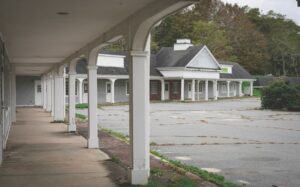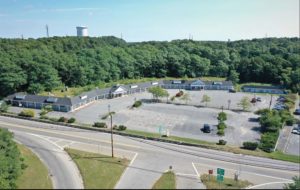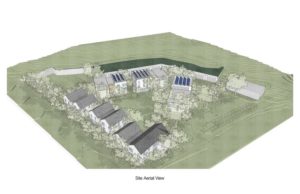ORLEANS — The developer who purchased the former Bayberry Plaza on Route 6A, also known as the “underground mall,” has downsized his plans for housing on the site. Last fall the proposal was for 42 residential rental apartments. That plan has been scaled down to 29 rental units with the possibility of a handful of condominiums mixed in.

Christopher DeSisto, president of Maple Hurst Builders in Boston, gave several reasons for the change. “Septic design considerations” were one reason, he wrote in an Oct. 23 email. “Unfortunately, the new town sewer does not service the property.”
Last September DeSisto told the Orleans Old King’s Highway Historic District Committee that a low-nitrogen septic system was among several features planned to reflect his company’s commitment to sustainability. An innovative/alternative (I/A) septic system is still part of the plan.
George Meservey, the town’s director of planning and development, said last week he had recently met with DeSisto and reviewed a full set of plans for a revised proposal, which he characterized as “robust.” He expects formal plans to be filed with the town within a month.
Abutters will have to be notified and a public hearing advertised, a process that will take four or five weeks. Site plan review in Orleans is done by the planning department, Meservey said. The project will require a special permit from the zoning board of appeals for the apartments to be constructed.
Meservey said he initially thought DeSisto had reduced the number of units to 29 so the project would fall below the 30-unit threshold that triggers a review by the Cape Cod Commission. While that could be one benefit, the reduction served another purpose, he said.
“The actual engineering showed difficulty getting it on the lot,” Meservey said. “He wants to save half the underground building for parking.” The lot covers 3.6 acres.
The old mall’s “underground” nickname refers to the fact that it was built into a berm around the edges of the property.
Changes in the economy also had an effect on the developer’s plans. “Interest rate hikes have made this significantly more challenging,” DeSisto said. “Originally, our project was all rental, but we have recently considered a hybrid ownership-rental.” Selling some units will help defray project costs, he said.
According to the Maple Hurst Builders website, the apartments will be a mix of one- and two-bedroom units. Three 2.5-story buildings will be placed along Route 6A with two three-story buildings in the courtyard. The original plan included three of the larger buildings instead of two. The exteriors will feature white cedar shingle sidewalls and clapboard siding in a white-and-light-gray color scheme.
The existing mall building will be converted into a protected parking area. Other parking on the lot will bring the total to 90 spaces.
“The top of the existing mall will remain a green roof and serve for recreation, events, and perhaps an orchard,” the developer’s website says. Most of the site is currently covered in asphalt. “We aim to reduce the pavement, utilize native plants to minimize lawn area, add solar arrays and construct energy efficient buildings,” the company says on its website.
The buildings will meet the town’s standards for height and setbacks, Meservey said. The plans for the I/A septic system will have to be reviewed by the health department.
DeSisto said he isn’t seeking any federal or state subsidies for the project. The town planner characterized it as “workforce housing with a small ‘w.’ ”
“It’s not deed-restricted,” Meservey said. “It will be market housing at reasonable rates.”
DeSisto has not yet said what those rental rates will be.
According to the March 2023 Orleans housing profile posted on the Cape Cod Commission’s website, there are an estimated 2,989 year-round occupied units in Orleans. Of those, 310, or 9.4 percent, qualify under state standards as affordable for low- to moderate-income households.
The median household income in Orleans is $79,250. More than half of the town’s households spend more than 30 percent of their incomes on housing costs.
Even though DeSisto’s plans are not focused on affordability, Jay Coburn, president and CEO of the Community Development Partnership, said it could be a good addition to the town’s housing stock.
“Over 90 percent of the housing on the Lower Cape is single-family detached homes — the most expensive type of housing,” Coburn said. “This housing monoculture contributes to our housing affordability crisis, a crisis that affects year-round residents at all income levels.”
According to Coburn, building more housing, particularly in village centers where transportation and other services are available, “is a good thing regardless of whether it is deed-restricted affordable or market rate.”
“The town needs housing, so the town applauds this effort,” Meservey said, adding it will redevelop a property that has been vacant for several years.
The town’s inclusionary bylaw requires that three of the 29 units be affordable. “If the project were being built in Provincetown, five of the units would need to be affordable under Provincetown’s more aggressive inclusionary zoning bylaw,” Coburn said.
DeSisto purchased the mall property in 2021 for $2.1 million.


